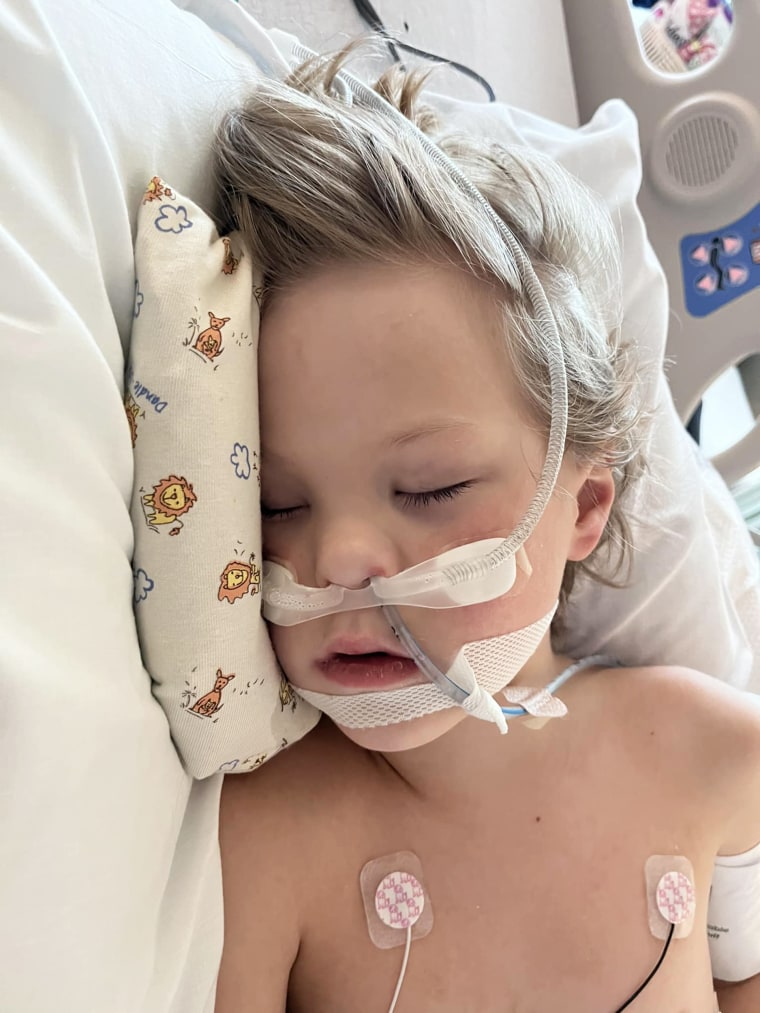During the last weekend of June, Aiden Debusk, 6, and his brother, Anakin Debusk, 3, took a hike with their father, Steven Debusk. When they returned, mom Laiken Debusk examined them closely.
“(My husband said), ‘There were a lot of ticks,’” Laiken Debusk, 25, of Russellville, Arkansas, recalls to TODAY.com. “I start checking the boys, and I pull one from the nape of Aiden’s neck and then one off his underwear line, and then I pulled six or seven off Anakin.”

When Aiden complained of headache that wouldn’t go away and stopped eating, his parents knew something was wrong and took him to the local hospital. He was soon transferred to Arkansas Children’s Hospital, where they learned what happened: Aiden had the tick-borne illness ehrlichiosis and experienced a rare reaction to it, leading to hourslong seizures and a medically induced coma. His mom hopes to raise awareness of the dangers of ticks.
“Make sure you do check if there are ticks,” Laiken Debusk says. “I’m not telling everybody to keep (their) kids in and never let them out anymore. But make sure you’re using the bug spray. Make sure they’re wearing pants. Make sure you change their clothes.”
A headache that would not go away
A few days after the hike, Aiden experienced a headache. His mom thought his allergies might be bothering him, so she gave him allergy medication. But it did little to ease his pain. Then he developed a low-grade fever.
“The fever was not bad enough to take him (into the hospital) yet, but bad enough for some at-home, over-the-counter medications,” Laiken Debusk recalls.
Aiden didn’t seem interested in eating or playing and went to bed early. When his dad woke him in the morning, he noticed Aiden had wet the bed and was lying in it without seeming to notice. His parents felt worried because Aiden was potty-trained and didn’t often have accidents.
When his mom tried to comfort him, he began yelping.
“He was just crying, hollering and screaming out in pain. There was nothing that was touching him,” Laiken Debusk says. “I didn’t really understand.”
She knew her son was struggling, so her husband took him to the local emergency room on July 2 while she stayed home with their other children. An hour later, she received a phone call from her husband asking for help.
“He’s like, ‘Hey, I need you to come up here. Aiden’s becoming really combative and just not being himself,’” Laiken Debusk recalls. “(I thought) that’s another red flag.”
By the time she arrived, doctors still felt unsure what Aiden was experiencing, even after running tests. Doctors noticed his white blood cell count was low, and he needed blood and platelet transfusion.
“At first, we thought he had cancer,” Laiken Debusk says.
Steven Debusk had mentioned the ticks, and doctors tested Aiden for tick-borne illnesses, but the results of those tests can take time. And Aiden’s tick bites had healed by the time he got sick, whereas his Anakin's had swelled up and had some discharge — but he was doing fine other wise. “There was no bad reaction to the actual site (on Aiden),” Laiken Debusk says.
Doctors at the local hospital transferred Aiden to Arkansas Children’s Hospital, where Aiden could get specialized care. He needed it as he began deteriorating quickly.
“When we first got here, he was going to the bathroom on himself,” Laiken Debusk says. “He couldn’t walk and didn’t really know his name.”
Aiden went into early-stage organ failure. Then he began experiencing neurological symptoms.
“(It) turned into a two-and-a-half hour seizure that they could only (stop) by intubating him and putting him a medically induced coma,” his mom says. “They waited two days, and they were trying to pull him out of the (coma) again, and when they did, he started having another seizure that actually ended up lasting six and a half hours.”
The family eventually learned that a tick bite caused Aiden’s illness. He had ehrlichiosis, an infection caused by certain bacteria carried by blacklegged ticks and lone star ticks.
Doctors started Aiden on the antibiotic doxycycline, which treats illnesses caused by ticks. But the infection also led him to develop a condition called central nervous system hemophagocytic lymphohistiocytosis, a type of overreaction of the immune system, which caused the seizures.
“It’s like your whole brain gets really angry and goes haywire,” Laiken Debusk says.
It’s unclear if Aiden will have permanent damage from the seizures. He’s finally out of the medically induced coma but has not spoken much.
“I heard him say, ‘I need,’ today but that’s all I could make out,” Laiken Debusk says. “He’ll start off kind of strong but then he peters out a bit.”
An MRI image of his brain shows his brain has “shrunk,” but it’s too soon to know what that means.

Aiden is awake, but he still has a long recovery ahead of him. From being in bed so long, he’s lost a lot of muscle and will need physical therapy, as well as speech and occupational therapy.
Ehrlichiosis
The lone star tick and blacklegged tick can carry the bacteria E. chaffeensis, E. ewingii or E. muris eauclairensis and transmit them through a bite, causing ehrlichiosis, according to the U.S. Centers for Disease Control and Prevention. Lone star ticks live in the south, central and eastern part of the United States, and blacklegged ticks live in the eastern half of the U.S., from Maine to east Texas.
Typically, ehrlichiosis only causes severe illness if antibiotic treatment is delayed, which can lead to organ failure and death. The immune system condition that caused Aiden's seizures and other neurological issues is rare, according to Johns Hopkins Medicine.
Normal ehrlichiosis symptoms usually begin five to 14 days after a tick bite, Dr. Sanjeev Swami, assistant professor of clinical pediatrics and pediatric infectious disease specialist at Children's Hospital of Philadelphia, who did not treat Aiden, tells TODAY.com.
Symptoms include:
- Fever
- Persistent headache
- Muscle aches
- Abdominal pain
- Nausea
- Vomiting
- Confusion
- A rash more commonly seen in children
“In pediatrics, about two-thirds of patients with ehrlichiosis will develop a rash,” Swami says. “The rash is fairly nonspecific. … It’s sort of a red rash that might be a little bit lumpy. Typically it should not blister.”
Doctors treat ehrlichiosis with the antibiotic doxycycline, which comes as either pills or IV fluids, and both "are very effective," Swami says. About half of his patients are unaware if they have been bitten by a tick. That's why he recommends that parents mention kids' lifestyles — such as frequent camping or hiking, spending a lot of times outdoors or having recently traveled to a state that has more tick activity — to doctors to help with diagnosis.
“Most of the time kids have no idea they had a tick bite,” Swami says. “I’ve honestly stopped asking, and I really ask more, ‘What have you been doing in the last few weeks?’ rather than ‘Did you ever see a tick on you?’”
Preventing tick bites is important, and experts recommend people use bug spray and clothing to protect against ticks. It’s also good practice to complete a tick check of the entire body following a day outside. Pets can also carry ticks into the house, so also consider checking any furry residents of your home to reduce exposure.

“Prevention is much better than treatment after the fact,” Swami says. “I always point to the CDC website on tick-bite prevention.”
‘Really surprising them’
While Aiden has been through a lot, he seems to be recovering.
“He’s really surprising them because technically he wasn’t even supposed to be talking or moving or waking up,” Laiken Debusk says. “They were actually telling me just a few days ago that if they couldn’t get his seizures to stop, we would have an end-of-life conversation.”
For the foreseeable future, Aiden will be in the hospital. Recently, his family feels encouraged.
“He definitely recognizes me. He definitely recognizes his daddy,” Laiken Debusk says. “He squeezed my hands a couple of times. … He’ll nod or shake his head a little bit. He’s definitely responding in his own way. (It's) just not like I’m used to.”
Now that her adrenaline has lessened a bit, Laiken Debusk says she’s exhausted. She’s grateful for the help and support she’s received from family and friends. When doctors told her family that Aiden had ehrlichiosis, they felt shocked — they had not heard about it. That’s why they shared their story.
“I had no idea,” she says. “I will say whatever I have to just so that parents will know (about ehrlichiosis) and will be looking out for it.”